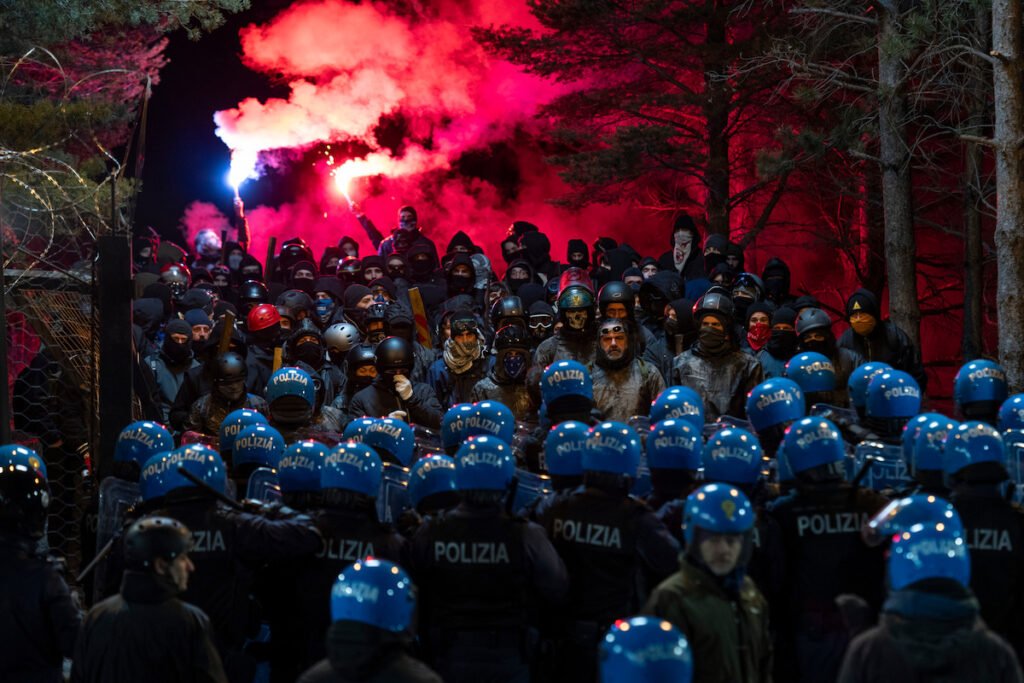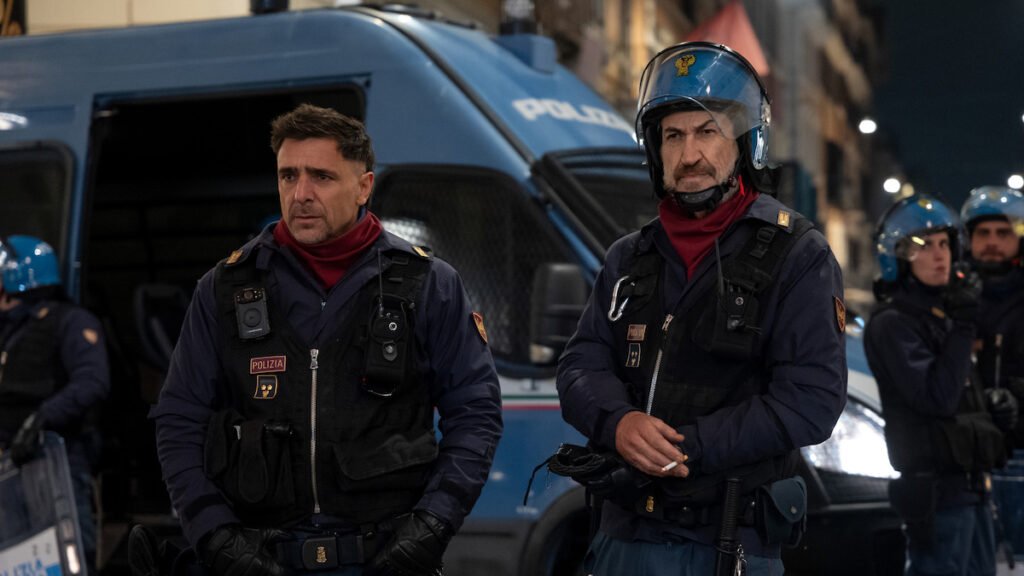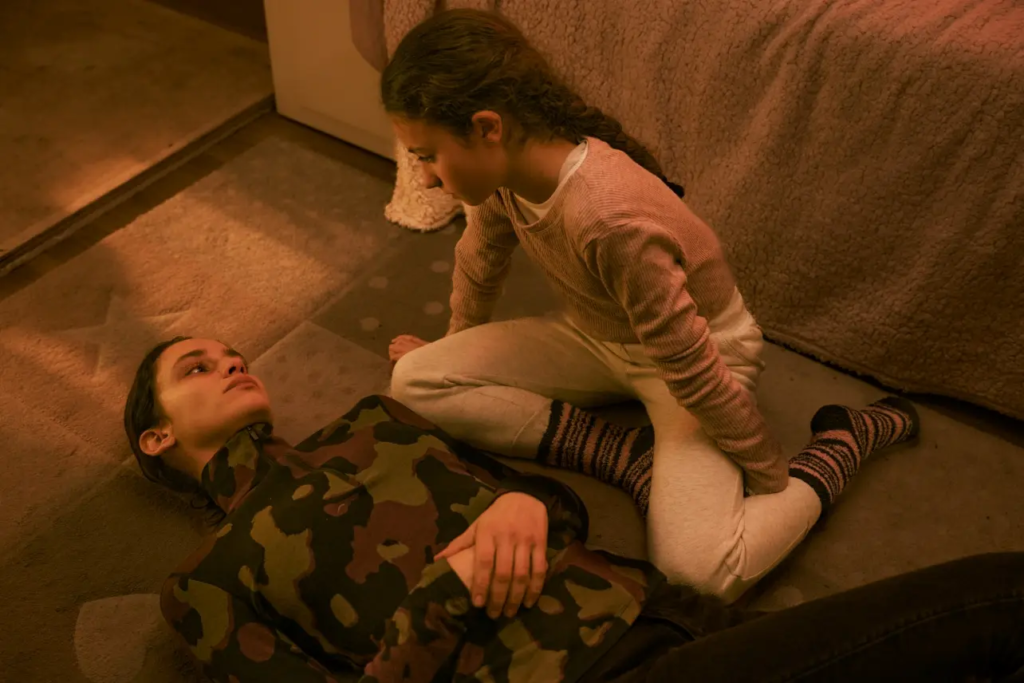Public Disorder Review: Gritty, Character-Driven Series with lots of Chaos - K-waves and Beyond

Director: Filippo Gravino
Date Created: 2025-01-16 23:49
3
Public Disorder Review: Netflix’s newest Italian thriller series A.C.A.B. La Serie, created by Filippo Gravino, and written by Carlo Bonini, follows the lives of a riot squad caught in the maelstrom of modern day Italy. With a stellar cast featuring Julia Messina, Francesco Buttironi, Marco Giallini, Valentina Bellè, Francesco Primavera, Adriano Giannini, and Benedetta Porcaroli, the story begins with a protest in Susa Valley spiralling into violence, leaving officer Pietro gravely injured. This event unravels a gripping narrative of political corruption, moral dilemmas, and deeply personal struggles within the squad.
Leading the team is Mazinga (Marco Giallini), a hardened veteran, alongside Marta (Valentina Bellè), a single mother grappling with financial struggles, and Michele Nobili (Adriano Giannini), a new commander trying to implement reforms amidst growing resistance. The series explores the fine line between maintaining order and losing humanity in an unforgiving world. The show comprises 6 episodes, each with a runtime of around 60 minutes.

Public Disorder Review
Netflix’s latest Italian thriller series, Public Disorder, blasts an intense trauma bomb up our noses and right into the dark corners of riot squad officers’ lives. The show adapts Carlo Bonini’s novel ACAB for its gritty realism, nuanced characters, and moral ambiguity. The six-episode series certainly has its strengths but also could be better. Now, I would love to share what worked and what did not.
It starts with a bang, literally. The start of the series is the riot squad intervening in a protest in Susa Valley. Built around law enforcement, it’s chaotic, violent, and morally questionable—and it immediately hooks us into the nerve racking world of it. The opening episode cleverly establishes the central conflict: The battle that went on internally in the squad and the battle outside with the public and law enforcement.
The series doesn’t hold back the complexities of policing in modern society, and I liked seeing that. These are officers, for all their various role as enforcers of the law, and they’re human beings going through personal struggles, grappling with ethical dilemmas, all this at times right on the line of when is it right, when is it wrong. It is a heavy, thought provoking theme that I got hooked on right away.

What sets Public Disorder apart is its cast of flawed, layered characters. Mazinga is deeply problematic but also charismatic and old school squad leader. It’s hard to root for someone whose disdain for accountability relies on violence, but Marco Giallini’s performance cashes in his humanity. It’s Michele Nobili, meanwhile, the reformist commander, who provides a compelling counterpoint. But one of the more intriguing head games surrounding that clash is built out of a generational and ideological divide within the force.
The one I most related to was Marta’s story. Her battles as a single mother torn between trying to hold down a job and her daughter’s best interests were gut wrenching. The personal sacrifices these officers make is made more real due to her vulnerability. On the flip side, however, the sub story of how Nobili’s daughter Emma copes with trauma was jammed in a little bit too fast. What I want from the series is to spend more time on exploring her experience and how it affected Nobili’s character.
However, this series is such a great representation of action and chaos. The riot scenes are intense, about as raw and unfiltered as is possible to shoot and had me feeling right in the middle of it. There’s the violent clash with West Ham fans but there’s also the glimpse of desperate action to protect a family from an angry mob. Not only are these sequences exciting, but they act as a reflection of the societal unrest, and discontent in the background.
But then there’s the fact that the show also is all too real in its depiction of Italy’s political and social climate. These protests, media, and public think reflect more of the society. It’s not about cops and protestors — it’s about a nation dealing with change.

Public Disorder has strengths, but it has flaws too. Some episodes strain for time, feel bloated, and others are quite rushed. To give a few examples, the Susa Valley incident investigation begins promisingly before running aground about halfway through. Then you have a tendency to jam pack too many subplots into one movie, which can dilute the impact of what the main story is.
The other problem is that some character arcs are fuzzy. I very much respect the show trying to tackle each squad members life but some stories felt unfinished or just fell flat. Salvatore’s backstory about his time with the Middle East is compelling but unpacked enough for us to grasp it. Also, like with Mazinga and his estranged son, the dynamic had potential, but it was surface level as well.
What’s most striking about Netflix’s Public Disorder is its unwillingness to give anyone a pass as completely good or completely bad. It’s a strength and a challenge of this moral ambiguity. It’s easy to moan about, as it adds depth to the story it also makes it harder to connect with some characters. Particularly divisive is Mazinga. Though his leadership is effective, though, his methods often cross ethical boundaries: I don’t know whether I should applaud his methods, or reject them altogether.
While highlighting great work that law enforcement is doing, the show also raises very uncomfortable questions about the role of law enforcement in a society that has a tendency to demonize police and so on. Are they heroes, villains or something in between? It’s left up to the viewer to interpret, both of which was refreshing and frustrating.
Summing Up
Italian thriller series Public Disorder is full of thought provoking storytelling and intense action. Differently from regular cop dramas, it explores the moral ambiguity and the personal life of riot squad officers. Despite failing on pacing and character development, it still gives a real, interesting themes that will make you want to watch the show.
Would I recommend it? Yes, but with some caveats. This series is for fans of intense, character driven thrillers that don’t hold back from saying the ugly truths. There are some slow moments and unresolved subplots but just be ready. Public Disorder series is ultimately a bold attempt at mapping a complicated subject, even if it doesn’t entirely succeed, it still sticks with you.
Public Disorder 2025 is now available on Netflix.
Also Read: Ad Vitam Review: Clichéd, Silly Thriller Which Doesn’t Entertain

Your posts always speak to me on a personal level and I believe that is a testament to your authenticity and genuine nature